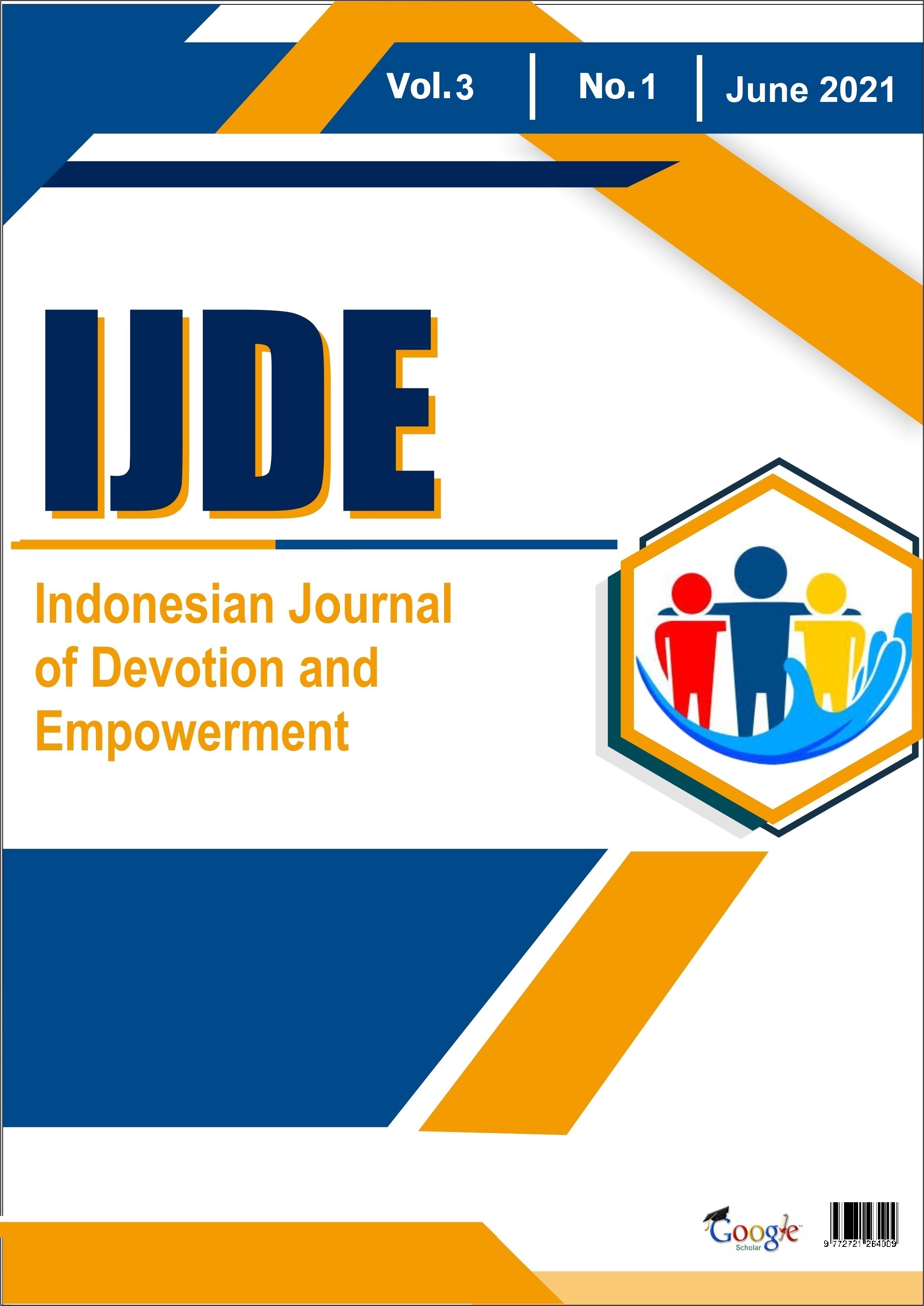STRENGTHENING THE PROFESSIONALISM OF ACCOUNTING TEACHERS SMK PGRI 2 TAMAN ON VILLAGE FINANCIAL SUBJECT
##plugins.themes.academic_pro.article.main##
Abstract
Kegiatan pengabdian ini bertujuan memahamkan materi pengelolaan keuangan desa yang ada pada kompetensi dasar tersebut. Metode pelaksanaan dan penerapan Iptek kepada masyarakat yang ditempuh adalah penyuluhan, demonstrasi, pendampingan, dan evaluasi. Masyarakat sasaran kegiatan adalah guru akuntansi SMK sejumlah 80 orang. Kegiatan dilakukan secara virtual menggunakan zoom meeting dan WA Grup. Hasilnya adalah guru dapat memahami pengelolaan keuangan desa dengan tingginya antusias dalam melakukan diskusi dan tanya jawab. Guru mulai memahami konsep dan jenis-jenis pendapatan, belanja, dan pembiayaan. Konsep tersebut dijelaskan dengan detail melalui contoh-contoh riil yang ada di pemerintah desa. Seperti contohnya ketika memahami materi pendapatan asli desa guru mendapat gambaran tentang penerimaan desa yang berasal dari pendapatan pasar desa, pendapatan BUMDes, pendapatan tanah bengkok, dan lain sebagainya. Begitu juga dengan belanja dan pembiayaan disampaikan dengan lugas dan jelas. Pemahaman konsep dan jenis-jenis pendapatan, beban, dan belanja akan mempermudah guru dalam melakukan pencatatan keuangan sehingga dapat menghasilkan laporan keuangan yang benar. Secara otomatis dapat meningkatkan profesionalitas bidang ilmunya.
This devotional activity aims to understand the village's financial management materials that exist in the basic competencies. Methods of implementation and application of science and technology to the community are counseling, demonstration, mentoring, and evaluation. The target community of the activity is vocational school accounting teachers numbering 80 people. Activities are conducted virtually using zoom meeting and WA Group. The result is that teachers can understand the village's financial management with high enthusiasm in conducting discussions and questions and answers. Teachers begin to understand the concepts and types of income, spending, and financing. The concept is explained in detail through real examples in the village government. For example, when understanding the original income material of the village, teachers get an idea of village revenues derived from village market income, BUMDes income, crooked land income, and so on. Similarly, spending and financing are delivered clearly and clearly. Understanding the concepts and types of income, expenses, and expenditures will make it easier for teachers to record their finances so that they can produce the correct financial statements. Can automatically improve the professionalism of the field of science.
##plugins.themes.academic_pro.article.details##
References
Azinar Ahmad, T., Susilowati, N., Subkhan, E., & Amin, S. (2019). Historiopreneurship and Commercialization of History Laboratory in Universitas Negeri Semarang. KnE Social Sciences, 2019, 706–715. https://doi.org/10.18502/kss.v3i18.4760
Dickfos, J., Cameron, C., & Hodgson, C. (2014). Blended learning: Making an impact on assessment and self-reflection in accounting education. Education and Training, 56(2), 190–207. https://doi.org/10.1108/ET-09-2012-0087
Handoyo, S. (2018). Study Motivation, Academic Performance and Commitment Career in Accounting Profession. Journal of Education and Learning (EduLearn), 12(3), 366. https://doi.org/10.11591/edulearn.v12i3.8078
Kania, I. (2020). A new approach to stimulate rural entrepreneurship through village- owned enterprises in Indonesia. https://doi.org/10.1108/JEC-07-2020-0137
Mahmud, A., Susilowati, N., Rachmadani, W. S., & Lestari, S. (2020). The Contribution of Village Fund Management for Creating More Prosperous Society : An Empirical Study at Central Java. 12(11), 357–371.
Ng, Y. H., Lai, S. P., Su, Z. P., Yap, J. Y., Teoh, H. Q., & Lee, H. (2017). Factors influencing accounting students’ career paths. Journal of Management Development, 36(3), 319–329. https://doi.org/10.1108/JMD-11-2015-0169
Nurkhin, A., & Susilowati, N. (2018). SEMINAR NASIONAL KOLABORASI IbM BAGI GURU AKUNTANSI INSTANSI / LEMBAGA SE-KOTA SALATIGA Pendahuluan. 1, 87–92.
Setyawan, S., Priyono, N., & Iswanaji, C. (2018). Development Model of E-Budgeting and E-Reporting System on the Management of Village Fund Finance. Jurnal Dinamika Akuntansi, 9(1), 92–99. https://doi.org/10.15294/jda.v9i1.12000
Susilowati, N, Herdiani, A., & Widhiastuti, R. (2018). Village Community Participation Model in Village Funds Management to Exteriorize the Accountability. KnE Social Sciences, 3(10), 1024. https://doi.org/10.18502/kss.v3i10.3190
Susilowati, Nurdian, & Latifah, L. (2016). the Implementation Effect Blended Learning Approach on Accounting Knowledge and Generic Skills. Journal of Accounting and Business Education, 1(1), 66. https://doi.org/10.26675/jabe.v1i1.6730
Susilowati, Nurdian, Mahmud, A., Widhiastuti, R., & Rahman- ingtyas, W. (2020). Good Village Governance: Internal Control Model of Village Funds Management. KnE Social Sciences, 2020, 137–148. https://doi.org/10.18502/kss.v4i6.6594
Undang-Undang Republik Indonesia Nomor 6 Tahun 2014 Tentang Desa, Pub. L. No. 6 (2014).
Unnes, F. E. (2010). Studi Evaluasi Kompetensi Mengajar Mahasiswa Praktek Pengalaman Lapangan (Ppl) Jurusan Akuntansi Universitas Negeri Semarang. Lembaran Ilmu Kependidikan, 39(2), 112–124.
Wardoyo, C., Herdiani, A., Susilowati, N., & Harahap, M. S. (2020). Professionalism and professionalization of early stage teachers in higher education. Journal of Applied Research in Higher Education, 12(5), 1175–1187. https://doi.org/10.1108/JARHE-04-2019-0100
